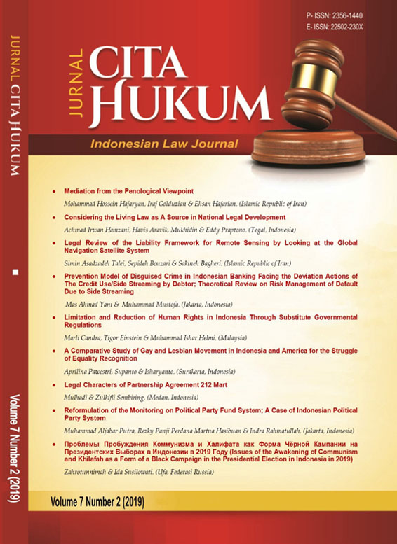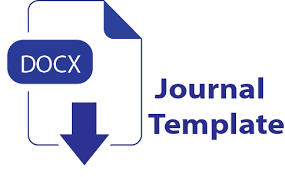Mediation from the Penalogical Viewpoint
DOI:
https://doi.org/10.15408/jch.v7i2.10718Keywords:
Mediation, Penal, PenologyAbstract
Abstract:
Due to increasing population and heaviness of the judicial system's burden and high expense of referring to the courts for the people of society, the judicial system tries to settle disputes through traditional and low-cost ways. Mediation is a body which has a long history in settlement of disputes between persons however the use of mediation has advantages and disadvantages. As mediation cost is lower than cost of referring to court, the parties will prefer to use this body. The result of mediation creates liability for the criminal although theliability has no predetermined legal punishment, it is criminal liability which is enacted by the nongovernmental persons under supervision of government for the status quo of the dispute. Punishment hasdifferent function at different times. It sometimes had authoritarian function and was controlled by the states and sometimes had preventive-corrective function and aims to protect people against the offender's behavior. This article attempts to show purpose of the mediation result in societies.
Keywords: Mediation, Penal, Penology
Abstrak
Peningkatan populasi dan beratnya beban sistem peradilan dan mahalnya biaya merujuk ke pengadilan untuk masyarakat menimbulkan sistem peradilan mencoba menyelesaikan perselisihan melalui cara tradisional dan berbiaya rendah. Mediasi adalah suatu badan yang memiliki sejarah panjang dalam penyelesaian perselisihan antara orang-orang, namun penggunaan mediasi memiliki kelebihan dan kekurangan. Karena biaya mediasi lebih rendah daripada biaya merujuk ke pengadilan, para pihak akan lebih suka menggunakan badan ini. Hasil mediasi menciptakan pertanggungjawaban bagi pelaku kejahatan, walaupun pertanggungjawaban tersebut tidak memiliki sanksi hukum yang telah ditentukan. Dia adalah pertanggungjawaban pidana yang diberlakukan oleh orang-orang non-pemerintah di bawah pengawasan pemerintah untuk status quo dari perselisihan tersebut. Hukuman memiliki fungsi yang berbeda pada waktu yang berbeda. Kadang-kadang memiliki fungsi otoriter dan dikendalikan oleh negara dan kadang-kadang memiliki fungsi preventif-korektif dan bertujuan untuk melindungi orang terhadap perilaku pelaku. Artikel ini berupaya menunjukkan tujuan hasil mediasi di masyarakat.
Kata Kunci: Mediasi, Penal, Penology
Аннотация
Рост населения, тяжелое бремя системы правосудия и высокая стоимость обращения в суд для сообщества породили идею для судебной власти - попытаться разрешать споры с помощью традиционных и недорогих средств. Посредничество - это досудебное урегулирование с помощью лиц, которые имеют долгую историю разрешения споров между людьми. Однако использование посредничества имеет свои преимущества и недостатки. Стоимость посредничества ниже, чем стоимость обращения в суд, и стороны предпочтут воспользоваться этим лицом. Результаты посредничества создают ответственность для лиц, совершивших преступления, даже если ответственность не имеет заранее определённых правовых санкций. Это - уголовная ответственность, налагаемaя неправительственными гражданами под государственным контролем за статус-кво в споре. Наказание имеет разные функции в разное время. Иногда оно выполняет авторитарную функцию и контролируется государством, а иногда выполняет превентивно-корректирующую функцию и направлено на защиту людей от поведения преступников. Эта статья пытается показать цель посредничества в сообществе.
Ключевые слова: посредничество, уголовное наказание, пенология
References
Ardabili, M.A. Journal of Criminal Victim and Prevention of Crime. Mizan Publication. Teheran. 2014.
Bakhtiari, S. Associate Professor of History of Islam at Alzahra University. Zahra Nazar Zadeh. M.A. graduate of History of Islam at Alzahra University. Journal of History of Islam. No. 1.
Bouloc, B. Penology. Translated by Ali Hossein Najafi Abrand Abadi. Majd Publication. Tehran. Eighth publication. Fifth Edition. 2008.
Garshasbi, A. Art and Technique of Mediation. Tehran. Mohajer Publication. 2007.
Gholami, H. Restorative Justice, Principles, and Methods. Danesh-e-Entezami Journal. No. 4, Fifth Year. 2003.
Safari, A. Penology. Jungle Publication. 28th Edition. 2015.
Samavati, P. Restorative Justice and Criminal Justice or Its Change. Negah Bineh Publication. First edition. 2006.
Zehr, H. Translated by Hossein Gholami. Correctional & Rehabilitation Journal. No. 124. September 2012.











